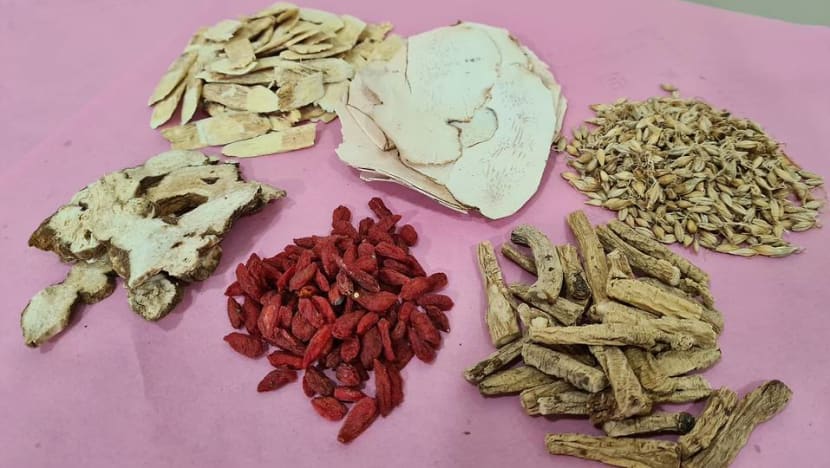National Cancer Centre Singapore trial to evaluate benefits of TCM on cancer survivors' quality of life

Malt and wolfberry are some of the herbs used in the trial conducted at the National Cancer Centre Singapore. (Photo: Singapore Thong Chai Medical Institution)
SINGAPORE: Would patients who suffer from cancer-related fatigue benefit from traditional Chinese medicine (TCM)? That is the question the National Cancer Centre Singapore is trying to answer through a first-time trial involving TCM to treat the side effects of cancer.
Cancer patients may experience a “distressing and persistent sense of physical, emotional and/or cognitive tiredness, which is a side-effect of cancer or anti-cancer treatments”, NCCS said in a press release on Thursday (Apr 22).
The condition is estimated to affect 50 per cent to 90 per cent of patients, and is assessed by asking patients how tired they feel on a scale of zero to 10, said medical oncologist Dr Tira Tan at a press conference held on the Zoom video conferencing platform.
Patients are also asked if they have been experiencing the fatigue for the last seven days straight.
“The problem is it's quite distressing because your usual activities that, you know, in short, make life meaningful such as socialising, exercising, going to work, can sometimes be affected,” she said.
The exact cause of the fatigue is unknown but Dr Tan said "it is suggested that perhaps the pro-inflammatory nature of cancer and/or the treatments that are related to cancer may potentially lead to mitochondrial dysfunction".
Mitochondria are found in the body’s cells and produce energy.
TREATMENT FOR CANCER-RELATED FATIGUE
Dr Tan said that current recommended treatments for cancer-related fatigue include non-pharmacological management such as exercise, cognitive behavioural therapy and education. Pharmacological therapies such as stimulants ”haven’t been so effective” and are generally thought of as “investigational”, she said.
READ: NUS scientists find new mechanism of cancer formation that may lead to more effective treatment
“Very clearly, this is an area of need that we've identified that we can do more (in),” she said.
“We've also observed many of our patients with persistent symptoms turning to … traditional Chinese medicine, and that's what led to the idea of doing this study," said Dr Tan.
Cancer patients suffering from fatigue, are in remission and have completed active treatment for at least a month are eligible for the trial. Researchers hope to enroll 80 patients into the trial within two years and so far, more than 10 participants have been recruited, Dr Tan said.
NCCS is collaborating with Singapore Thong Chai Medical Institution for the trial.
HOW TRIAL WILL BE CONDUCTED
Participants will be randomised into two groups and administered the TCM treatment - an investigational modified formula known as “Xiang Bei Yang Rong Tang” made with 15 herbs - or placebo for eight weeks. They will have to take the treatment or the placebo every day.
READ: ‘My whole world collapsed’: A mother's fight against breast cancer to regain her life
They will be screened onsite at NCCS by certified TCM physicians to check their “qi” or “life force” and blood deficiency before being enrolled on the trial.
Ms Zheng Huangfang, chief medical officer at Singapore Thong Chai Medical Institution, said that a clinical assessment is done through four diagnostic methods- inspection, listening and smelling, inquiring and palpation.
The symptoms and signs presented by the patient will be quantified using a questionnaire to classify the severity of “qi” and blood deficiency the patient is experiencing, she added.
“In TCM literature XBYRT (the TCM treatment) is believed to be able to augment 'qi', nourish the blood, improve appetite and calm the mind with the aim of alleviating cancer-related fatigue in cancer survivors,” Ms Zheng said.
“Post-treatment cancer patients commonly present with qi and blood deficiencies, due to the exhaustive nature of tumour and treatment-induced side effects to the body,” she said.
“From our observations, cancer patients also commonly present with stagnated qi, potentially caused by emotional distress from cancer diagnosis, their inherent personality, sedentary lifestyle or other factors. Based on this, XBYRT should be effective in treating these types of post-treatment cancer patients.”
READ: Cancer myths: The misconceptions that are not easily debunked
NCCS said that participants’ quality of life, fatigue levels and cognitive function will be assessed using “well-validated assessment tools over serial time points”.
A TCM physician will also assess the participants’ response to the treatments to determine if levels of “qi” are restored.
“The results of this trial would be a valuable addition to existing literature. Results can provide both clinical and biochemical basis guiding the design of future studies to facilitate a better understanding of possible biological mechanisms contributing to the effects of TCM,” NCCS said.












